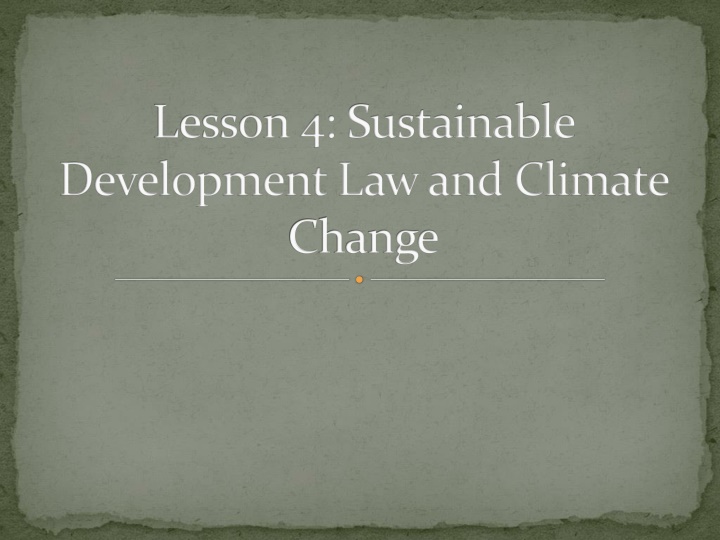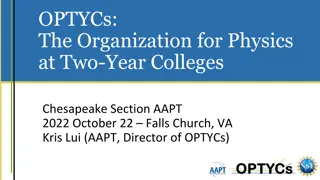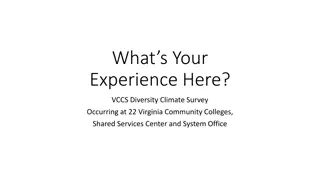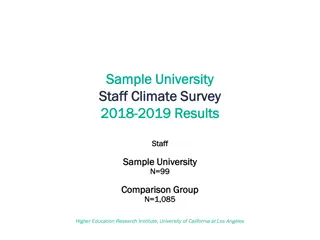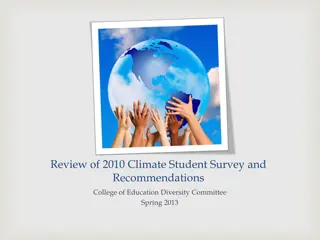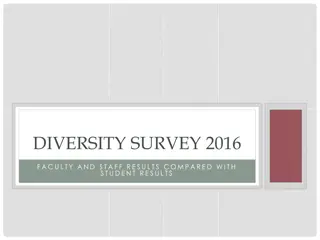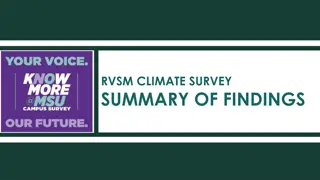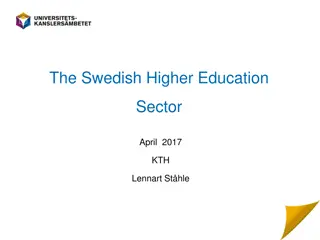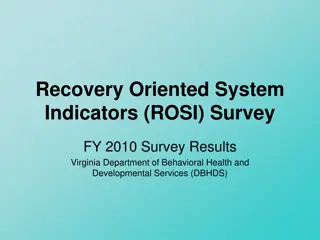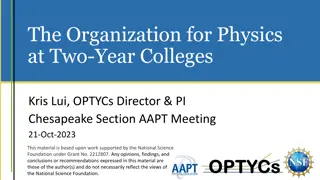Virginia Community Colleges Diversity Climate Survey
This initiative involves a Diversity Climate Survey at 22 Virginia community colleges, designed to gather feedback from employees and students about their experiences in a safe and respectful environment. The survey aims to capture perspectives on diversity, provide a rare opportunity for marginalized voices to be heard, and offer recommendations for moving forward based on the data collected. The survey is supported by the Virginia Foundation for Community College Education and the Anthem Blue Cross/Blue Shield Foundation, with incentives such as gift cards for participants.
Download Presentation

Please find below an Image/Link to download the presentation.
The content on the website is provided AS IS for your information and personal use only. It may not be sold, licensed, or shared on other websites without obtaining consent from the author.If you encounter any issues during the download, it is possible that the publisher has removed the file from their server.
You are allowed to download the files provided on this website for personal or commercial use, subject to the condition that they are used lawfully. All files are the property of their respective owners.
The content on the website is provided AS IS for your information and personal use only. It may not be sold, licensed, or shared on other websites without obtaining consent from the author.
E N D
Presentation Transcript
Lesson 4: Sustainable Development Law and Climate Change
Lesson 4: Sustainable Development and Climate Change It is well recognized that the climate change phenomenon has never been just an environmental issue, as traditionally conceived. As a consequence, the Climate Change Regime, from the outset, had a breadth and a contextual richness that went far beyond international environmental law stricto sensu. And the Climate Change Regime does not simply refer to the 1992 UN Framework Convention, the 1997 Kyoto Protocol and the work of the subordinate bodies established thereunder, either. To construe it in this way would be a gross simplification of the developing polity on climate change, and would also ignore the variety and complexity of the interactions and issues that permeate the climate change agenda. Rather, the Climate Change Regime consists of many official, semi-official and non-official commercial, scientific and public-interest communities that interact with and seek to influence the legal and political developments. It includes scientific cooperation bodies, such as the Intergovernmental Panel on Climate Change (IPCC), whose reports have proved an increasingly scientific basis for international action, as well as important NGOs and aboriginal communities who efforts to seek stronger commitments from sometimes recalcitrant governments and companies and engage in monitoring have been invaluable in developing international and domestic law on climate change.
Lesson 4: Sustainable Development and Climate Change Climate change is one of the core areas of the emerging international and national law on sustainable development. The preamble to the United Nations Framework Convention on Climate Change affirms that responses to climate change should be coordinated with social and economic development in an integrated manner with a view to avoiding adverse impacts on the latter, taking into full account the legitimate priority needs of developing countries for the achievement of sustained economic growth and the eradication of poverty. Some have even gone so far as to say that the international response to climate change, along with the 1992 Convention on Biological Diversity, affirms the place of sustainable development in international law.
Lesson 4: Sustainable Development and Climate Change Three general observations can be made about international and national efforts to address climate change through the development of sustainable development law.
Lesson 4: Sustainable Development and Climate Change First, the United Nations Framework Convention on Climate Change represents one of the most important attempts to balance between the serious concerns of different groups of developed and developing countries, with regards to the economic development strategies and industries of them all. This is particularly important in the treaty negotiations and continued efforts to refine the treaty, since the negotiations embraces both Northern and Southern concerns in a delicate balance, giving neither undue pre-eminence to the global over the regional, national or local, nor ignoring the magnitude of the global problem. The Convention encourages continuing dialogue between and within developed and developing states and seeks to promote active negotiations between the parties. It involves differentiated moral and legal obligations on the countries party to the treaty. In addition, at a more substantive level, the United Nations Framework Convention on Climate Change represents evidence of the importance, if not legal necessity, of adopting a more integrated approach to international issues. Most may not want to go as far as former Vice-President Weeramantry in his separate opinion in Gabcikovo-Nagymaros (1997), where he puts forward his idea of sustainable development acting almost as a legal bridge between the right to development and the right to environmental protection, but nevertheless most would accept the emerging normative significance of Principle 4 of the Rio Declaration in this regard. As Principle 4 notes, environmental protection shall constitute an integral part of the development process and cannot be considered in isolation from it. Integration is at the heart of sustainable development and, as this chapter will make clear, it may be sustainable development s most important contribution to the legal debate.
Lesson 4: Sustainable Development and Climate Change The climate change regime also has broader political significance. Consequently, the second general comment is that the climate change regime arguably represents the most politically important collaboration yet at bringing together social, economic and environmental factors within one framework. The question then becomes whether the necessary political will and legal mechanisms are available for it to succeed? The international community is very good at dividing issues into manageable pieces. Since the emergence of the League of Nations and the United Nations system, there has been a trend towards the increased fragmentation and simplification of international law into subject-specific fields. Of course, such fragmentation has generally proven to be exceedingly beneficial in the development of international law; as demonstrated by the development of a workable and surprisingly efficient international legal system and, just as important, the emergence of an exceedingly competent international civil service. However, a negative aspect of this development has been the general lack of integration between subject areas, not only in terms of the substantive content of international law, but also the personnel who make up the international system. Consequently, the international community has not been good and remains poor at being able to think outside the box. The adoption of the United Nations Framework Convention on Climate Change and subsequent developments represent a real attempt by the international community to try to move beyond this compartmentalization and take a much more holistic approach to an issue, as is, in any event, mandated by sustainable development. The success or otherwise of such an endeavour is, of course, debatable. But what is quite clear is that most states recognize the broader political implications of getting the climate change problem right, even if they cannot agree upon the measures necessary. It is only through the setting of challenging targets within an international framework that a scientifically appropriate and as important equitable solution can be negotiated for what is an inherently international issue. In the words of the Convention: change in the Earth's climate and its adverse effects are a common concern of humankind. As has been noted elsewhere, sovereignty can no longer just be internally focused; it must not be treated as a static, immovable fact, but rather as a flexible tool through which states can more effectively act in an increasingly interdependent global society .
Lesson 4: Sustainable Development and Climate Change The third general comment is that by adopting the 2001 Marrakech Accords, which seek to elaborate upon the framework provisions of the Kyoto Protocol, the climate change regime has a real chance to become more than just a paper exercise (if and when it enters into force). The full implementation of the Kyoto Protocol will dramatically alter the nature of the climate change regime. The largely discursive nature of the regime up to this point will become a much more serious endeavour, with real rules to implement and enforce. But there is also a real risk, discussed below, that hard rules, if not appropriately formulated, can ignore wider societal concerns. How such rules are made sustainable will be crucial to the acceptability and ultimate success of the Kyoto Protocol.
Lesson 4: Sustainable Development and Climate Change The elaboration of a climate change regime in order to realise sustainable development involves a number of thorny issues where social, economic and environmental concerns and priorities intersect. All share a common theme in that the science and politics of climate change do not, by themselves, provide definitive answers to these issues. The technological imperative of much of the climate change agenda needs the more contextual application of sustainable development to tackle such societal concerns. It is here, as the need to balance these conflicting economic, social and environmental concerns and seek an equitable resolution to the emerging problems intensifies, that the role of a knowledgeable judge takes on fundamental and crucial significance.
Lesson 4 Summary In this Lesson, you learned about the relationship between sustainable development and climate change. You learned that there is a strong overlap of principles relating to sustainable development and climate change law.
